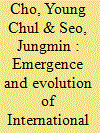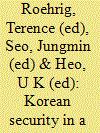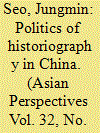|
|
|
Sort Order |
|
|
|
Items / Page
|
|
|
|
|
|
|
| Srl | Item |
| 1 |
ID:
183219


|
|
|
|
|
| Summary/Abstract |
This study investigates how International Relations (IR) as an academic discipline emerged and evolved in South Korea, focusing on the country's peculiar colonial and postcolonial experiences. In the process, it examines why South Korean IR has been so state-centric and positivist (American-centric), while also disclosing the ways in which international history has shaped the current state of IR in South Korea, institutionally and intellectually. It is argued that IR intellectuals in South Korea have largely reflected the political arrangement of their time, rather than demonstrate academic independence or leadership for its government and/or civil society, as they have navigated difficult power structures in world politics. Related to this, it reveals South Korean IR's twisted postcoloniality, which is the absence – or weakness – of non-Western Japanese colonial legacies in its knowledge production/system, while its embracing the West/America as an ideal and better model of modernity for South Korea's security and development. It also reveals that South Korean IR's recent quest for building a Korean School of IR to overcome its Western dependency appears to be in operation within a colonial mentality towards mainstream American IR.
|
|
|
|
|
|
|
|
|
|
|
|
|
|
|
|
| 2 |
ID:
101756


|
|
|
|
|
| Publication |
2010.
|
| Summary/Abstract |
The articles in this, the one of three special issues of Alternatives on the theme of indigenous politics in the globalizing world, deal with important questions: How are the flows of people and ideas as well as the institutions to manage them impeded or assisted by the state and other social, political, and economic institutions? What does improved knowledge and understanding of these flows contribute to how one defines an indigenous community? What role do global technologies play in linking migrant and diasporic communities to each other and to the homeland? Authors in this issue articulate the local, national, and global contexts in which indigenous identity, interests, and consciousness are constructed and reconstructed through the case studies of Australia, Taiwan, Latin America, and Hawaii and produce novel perspectives that replace conventional understanding of indigenous politics. Instead of depicting indigenous people as passive victims of neoliberalism, globalization, and technological development, these studies illuminate agency, strategies, and the subjectivity of indigenous resistance in the twenty-first century.
|
|
|
|
|
|
|
|
|
|
|
|
|
|
|
|
| 3 |
ID:
081946


|
|
|
|
|
| Publication |
Westport, Praeger Security International, 2007.
|
| Description |
vii, 213p.
|
| Standard Number |
9780275998349
|
|
|
|
|
|
|
|
|
|
|
|
Copies: C:1/I:0,R:0,Q:0
Circulation
| Accession# | Call# | Current Location | Status | Policy | Location |
| 053578 | 355.0330519/ROE 053578 | Main | On Shelf | General | |
|
|
|
|
| 4 |
ID:
085293


|
|
|
|
|
| Publication |
2008.
|
| Summary/Abstract |
This article contextualizes the emergence of the Chinese claim over the historical ownership of Koguryo in the politics of historiography in China. Contemporary Chinese historiography from which the Chinese state and populace draw core identities has never been fully fixed or stabilized. Regardless of the temporal distance from the present, Chinese pasts are continuously constructed and re-memorized based on contemporary sociopolitical needs. Compared to the pre-reform eras, broadened social spaces in China have made the Chinese Communist Party's monopoly over historiography untenable. In that sense, the future of East Asian regional order or Sino-Korean relations is highly unpredictable, if not unstable, due to the continuously changing Chinese national identity. With radical nationalization of China's imperial past, the next generation in China may favor actions to alter the status quo. National and state identities informed by "historical facts" are hardly negotiable or changeable.
|
|
|
|
|
|
|
|
|
|
|
|
|
|
|
|
|
|
|
|
|